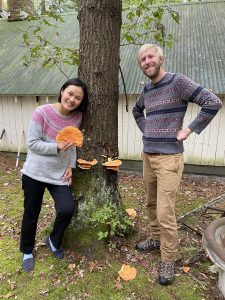
Matthew and Anmei Harhai teach people how to forage for mushrooms. Here they have found chicken of the woods on a tree.
(Oct. 19, 2023) Mathew Harhai of Goat Plum Tree Farms introduces people to the wonderful world of mushrooms.
Harhai calls himself an amateur when it comes to mycology, the study of mushrooms, since he did not graduate with a degree. He learned how to forage for mushrooms when he lived in Oregon around Mount Hood.
He may not be a professional mycologist, but he knows mushrooms and shares his expertise and passion with others through classes he conducts at Mariner’s Country Down in Berlin.
During the class, participants are told about the health benefits of mushrooms the newest research and rules to live by. Then Harhai takes the group out foraging on the property, which boasts an array of mushrooms, that he helps his students identify. Then he cooks wild mushrooms for the group to taste.
“At Mariner’s Country Down we find so many different mushrooms including boletes, russulas, amanitas, and wood conks. We find over 16 varieties of edible mushrooms, including honey mushrooms, chanterelles, lion’s mane, chicken of the woods, and oysters,” Harhai said.
Classes are designed to be engaging for young and old.
While many mushrooms are edible, some are poisonous.
“Most poisonous mushrooms won’t kill you, but they might make you wish you were dead,” Harhai said.
Harhai believes that picking a mushroom is the best way to identify one, as harvesters want to look at all its features: stems, gills, and pores. There are guidebooks that can be used to help identify mushrooms, but it’s important to forage with someone who is educated in mushrooms before eating one.
Harhai said that scientists have identified about 3,000-5,000 species of mushrooms but it is believed there are more than 10,000 types in existence. He said with the decline of biodiversity, the world is losing mushroom species before people can even identify them.
Harhai explained that mushrooms have three roles. One is to help matter decompose by growing on decaying plants and animals. A second role is networking, which entails mushrooms that are connected with the roots of over 90 percent of land-dwelling plants. Then there are parasitic mushrooms that live off of a host plant. He said there are also mushrooms that have been found to grow towards nuclear fallout, like oysters of the land, cleaning up contaminants.
Harhai said there remain many wild spaces on the Estern Shore to explore for mushrooms.
One of his favorite places is Pocomoke Forest, which he considers a beacon of biodiversity.
“It’s great to live in a rural setting where there are still a lot of forests around which hold a lot of biodiversity.”
Besides the mushroom foraging classes, he offers instruction on how to create a gourmet mushroom log and sells mushroom logs so people can grow their own mushrooms at home.
He has a small organic farm on Mariner’s Country Down called Goat Plum Tree Farm that specializes in berries and tree fruits.
He will be speaking at the Ocean Pines Library on Oct. 23 at 11 a.m. The event is called Farm to Library and is being presented by the Friends of Ocean Pines Library.
His next foraging class is on Nov.11 from 9 a.m.-noon. He also sells mushroom T-shirts on Etsy, with a portion of all profits going to fungi perfecti studies to save bees and fungi.
Harhai has a stand at the Berlin Farmers Market during the season, which is now over. Follow Goat Plum Tree Farm to find out about classes and other events at https://www.facebook.com/GoatPlumTreeFarm
